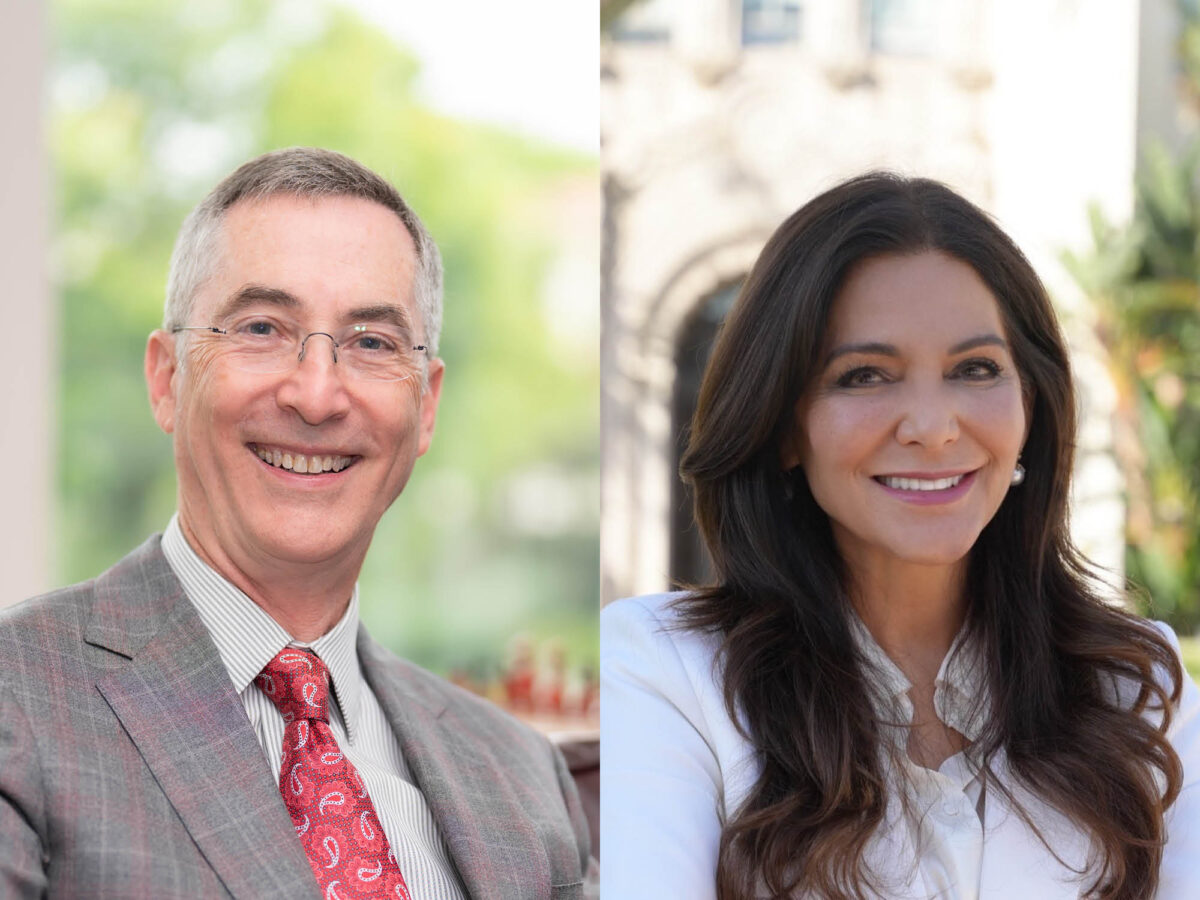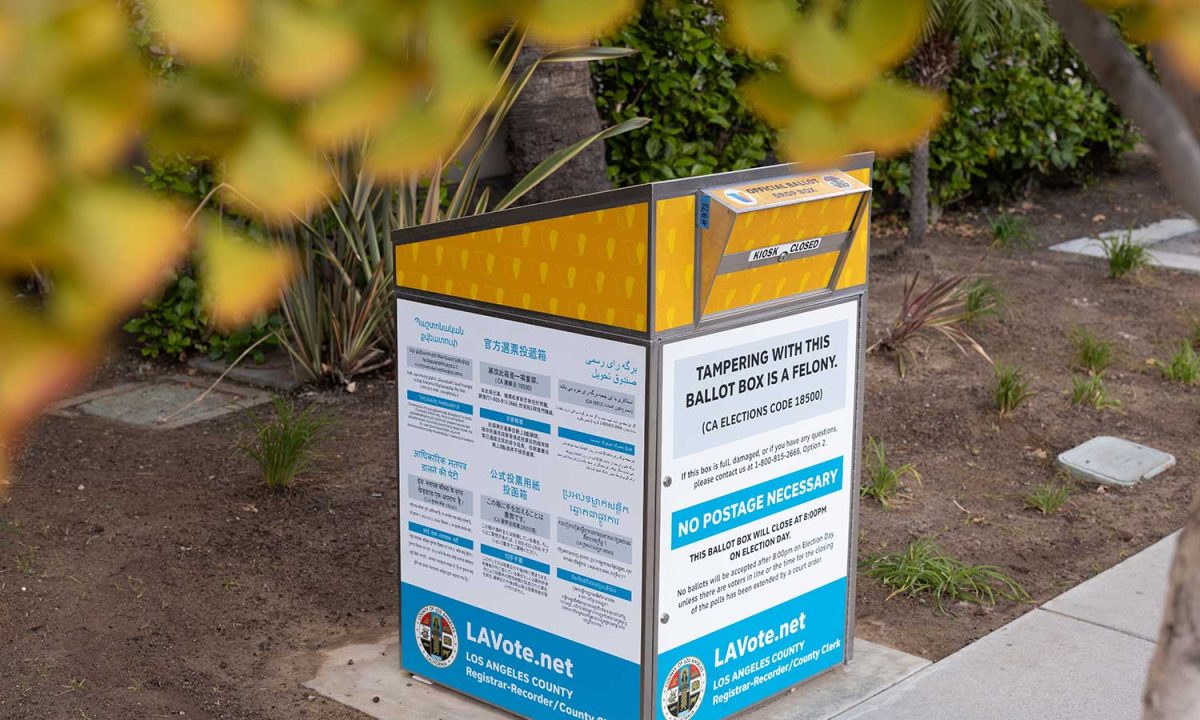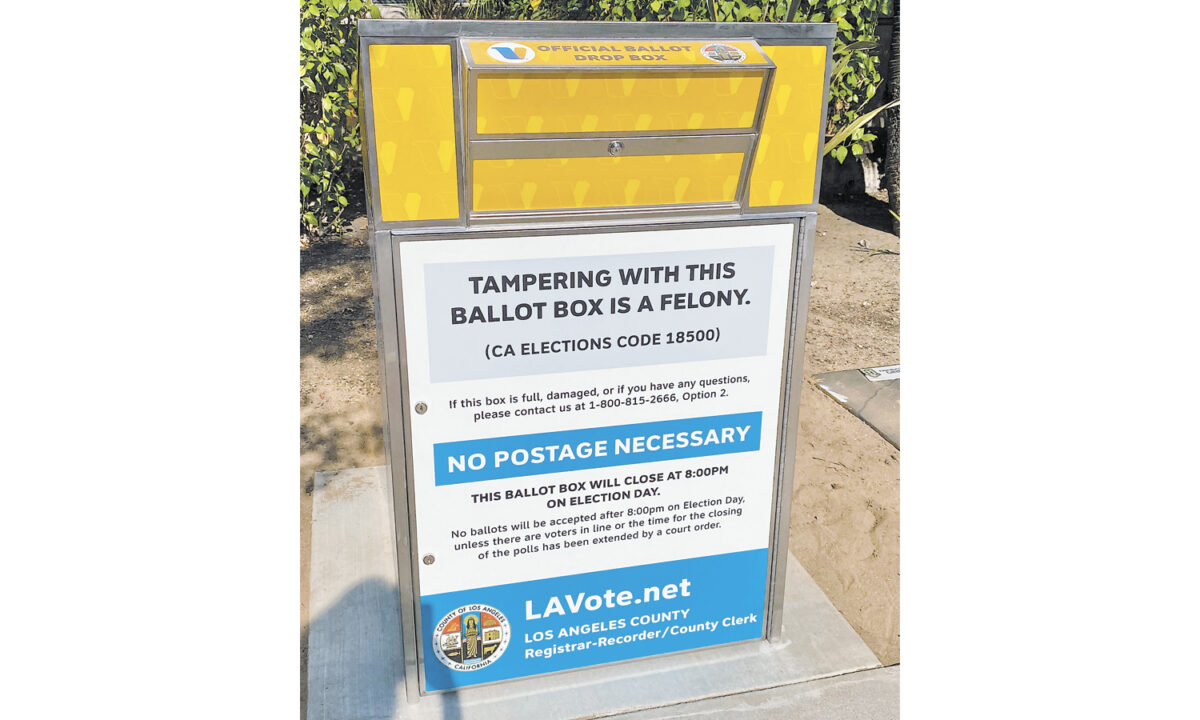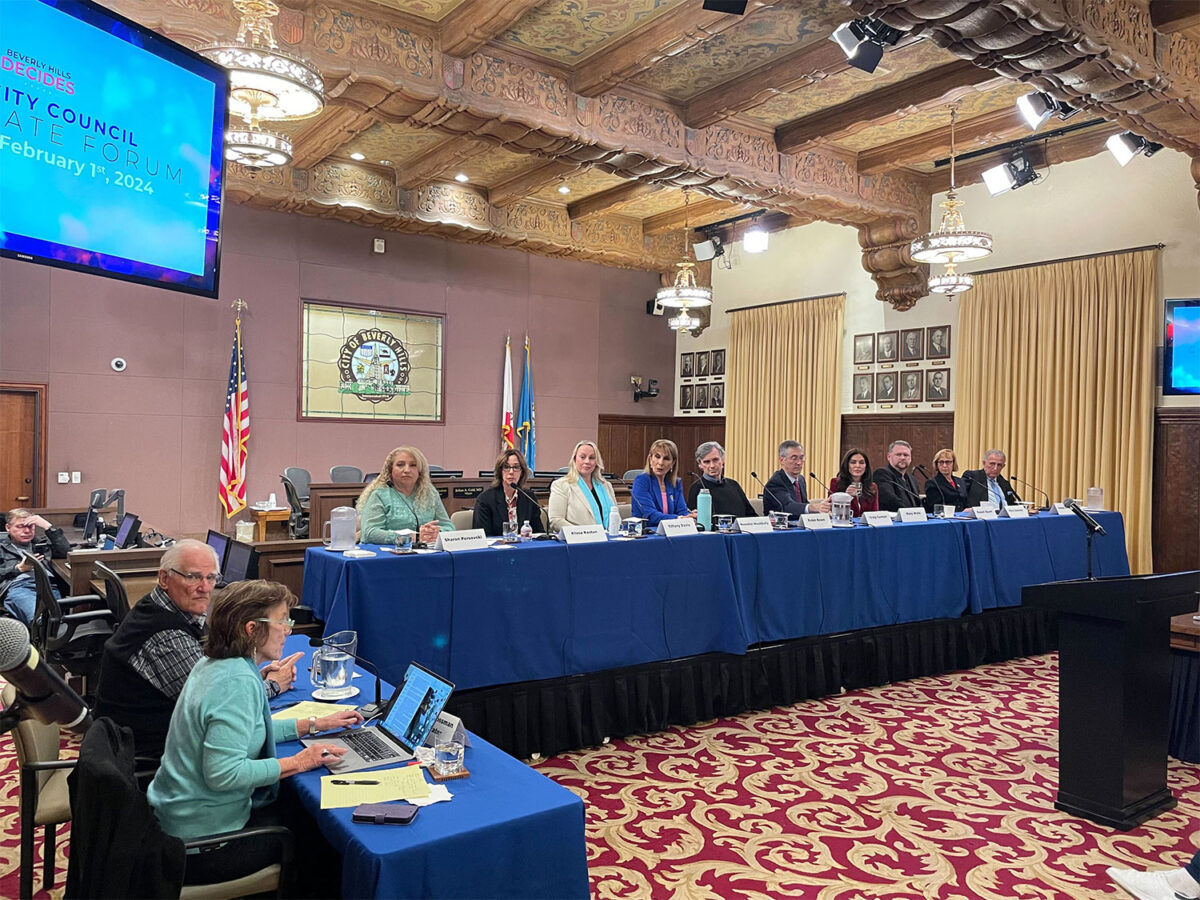Eleven challengers are vying to unseat Los Angeles County District Attorney George Gascón in a crowded primary election on March 5, against the backdrop of two failed recall attempts and votes of no confidence by 37 cities including Beverly Hills. If no candidate gets more than 50% of the vote next month, the top two finishers will face off in the general election on Nov. 5.
“I believe the race for Los Angeles District Attorney has always been a competitive office to seek,” said Gascón, when asked whether a resurgent focus on law and order has fueled the contest. “Typically, many candidates are interested in running for office regardless of narrative amongst the policies of the candidates; the small field in 2020 was more of an outlier, historically.”
According to Calabasas City Councilmember James Bozajian, a past president of the union for L.A. County deputy DAs, “In the last 20 elections for district attorney, there were four occasions where six people rounded out the field. But never more, until now.”
The challengers include four prosecutors in Gascón’s office—Eric Siddall, John McKinney, Jonathan Hatami, and Maria Ramirez—two former federal prosecutors—Jeff Chemerinsky and Nathan Hochman—two deputy DAs turned Superior Court judges—Debra Archuleta and Craig Mitchell—as well as San Bernardino County prosecutor Lloyd Masson, retired judge David S. Milton, and criminal defense attorney Dan Kapelovitz. This two-part series provides a closer look at each of them.
Eric Siddall has the distinction of having sued Gascón, his boss, over the DA’s directives on sentencing enhancements in 2021. Siddal was vice president of the Association of Deputy District Attorneys at the time.
The suit concerned the three strikes law, as well as Gascón’s day one order to dismiss enhancements that were already charged. “I developed, along with others in my union, a legal strategy,” Siddall said. “We won [and] got an injunction against him in the Superior Court, which was upheld by the appellate court.”
“The court ruled that he is not a monarch—that he has to abide by what the legislature and the people have voted on—and forced him to actually start following the law.”
A deputy DA since 2007, Siddall has spent most of his career prosecuting violent criminals, including in the hardcore gang division. That experience has informed his violence reduction strategy, a policy proposal recognizing that most violence is committed by a small percentage of the criminal population.
In prosecuting the Panorama City-based gang Blythe Street, Siddall recalled, “We focused our energy on the individuals who were ordering the murders—and there were dozens of murders—and the actual shooters.” Because of this targeted approach, “We didn’t have to go after a gang of 300, we only had to go after a dozen members.” The result was a dramatic reduction in the area’s homicide rate, including some years with no murders, he said.
Siddall would create an intelligence unit within the DA’s office to focus on those individuals who are the drivers of violence. By doing so, “we can actually reduce incarceration rates [and] we can reduce violence dramatically, all at the same time.”
“I’m not looking to turn back the clock,” Siddall said. He acknowledges the need for forward-looking approaches to the unhoused, the mentally ill and the death penalty (which he says does not work). He wants to expand the use of homeless courts, pointing as a model to Redondo Beach’s program for moving people towards supportive housing. And he advocates building a 3,500-bed secure facility where mental illness can be treated outside of jail.
As a young prosecutor handling misdemeanors, Siddall got to know Beverly Hills, the site of his third assignment. “I don’t think we were taking a very proactive approach in terms of how to get people out of the system, but we were actually prosecuting those crimes, which right now we’re not doing,” he said. “Quality-of-life crimes affect everyone. I don’t think you do any favors to the residents—and you do not do any favors to the people who are committing these crimes—by simply ignoring them.”
Siddall is endorsed by the Association of Deputy District Attorneys.
John McKinney came of age 10 miles outside New York City in Passaic, New Jersey, as the crack cocaine epidemic was devastating urban America. “I’ve been pulled out of cars by police officers for no reason other than I was a young Black man in a car with other young Black men,” he said. “I know what it feels like to be racially profiled.”
As a prosecutor, McKinney has also come to know “very good police officers who do the job the right way, and I think there are far more of them than there are the other.” His experience on both sides of that divide makes him unique in the race, he said, and would be a first for a DA in Los Angeles.
“I’ve run the gauntlet, and I want to use that insight, along with my education at UCLA and my 25 years of on-the-job experience, to bring balance back to the criminal justice system,” McKinney said. In 2022, he successfully prosecuted the killer of noted Crenshaw rapper and activist Nipsey Hussle.
McKinney subscribes to a philosophy of proportional justice, in which each case and each defendant is considered individually. He rejects blanket policies and categorical dispositions. “But most of all I believe in reducing crime that makes our community less safe and less enjoyable to live in,” he said.
“We’re living at a time of mass victimization,” McKinney said of Gascón’s tenure. “Beverly Hills is suffering under the policies of a charlatan, despite having one of the finest police departments in Los Angeles County and the resources to detect crime. None of that matters if you have a district attorney who is not willing to follow through and demand accountability for people who break the law.”
McKinney notes that Gascón spent most of his 30 years as an LAPD officer under the leadership of Daryl Gates, whom he describes as “one of the most controversial leaders of the department, particularly for the way he has been accused of mistreating communities of color. Never once in that time did we hear George Gascón espouse anything remotely close to a progressive value [or] criticize the department for the way it was treating young Black men. It is only of late, and after he changed his political party from Republican to Democrat, that we hear him expressing concern.”
While the DA in reelection mode is “tough on any crime that makes it into the media … the George Gascón who showed up on Dec. 7, 2020 is still implementing blanket policies that don’t hold people accountable,” McKinney said. As supervisor for the adult misdemeanor courts in East L.A., McKinney handles lesser offenses that “in the aggregate really affect the overall look and feel of a community,” and in his view have a greater day-to-day impact than the felonies in the headlines: “They’re very important, they should be prioritized.”
McKinney is endorsed by Beverly Hills City Councilmember John Mirisch.
Jonathan Hatami has been a deputy DA for more than 17 years, prosecuting child abuse cases since 2016. “Under Jackie Lacey that was a priority, to make sure that individuals who are abusing, neglecting or murdering children are held accountable,” he said. But Gascón’s day one directives “disallowed us the ability of prosecuting child murderers to the fullest extent of the law.”
Morale in the office is now the lowest he’s ever seen, with prosecutors depressed by Gascón’s abandonment of victims and survivors and by his failure to seek input or collaborate. “He’s very much a dictator,” Hatami said.
While mass incarceration is not the way forward, “just not charging crime, and punishing victims in the present to try to fix injustices in the past, is an injustice in itself,” and has led to “a major public safety crisis,” Hatami said.
The solution instead has to be holistic, addressing public education, the homeless and drug addiction crises, and rehabilitation through collaborative justice and support courts. “I don’t believe in defunding the police, I believe in giving them more funds to make them better, helping with their training and hiring more police officers,” Hatami said. He is married to a sheriff’s detective and has the endorsement of several police officers’ associations, including that of Beverly Hills.
Hatami does not advocate “oppressive bail,” but as DA he would “use the bully pulpit to collaborate with my law enforcement partners and let the courts know that most people do not support zero bail.” Smash-and-grab robberies and organized retail theft would be charged as felonies, with conspiracy charges where appropriate. Misdemeanors overlooked by Gascón would be prosecuted, including resisting arrest, disturbing the peace, public drunkenness and soliciting prostitution. Public officials, too, would be on notice that no double standard exists for them if they offend.
Hatami would also appoint a deputy DA in each of the county’s 88 cities to liaise with the City Council and receive feedback. “East L.A. is much different than Lancaster, Lancaster is much different than San Dimas,” he said. “Each has different needs.”
Hatami is also endorsed by the elected DAs of Fresno, Riverside and Kern counties.
Jeff Chemerinsky was Chief of the Violent and Organized Crime section of the U.S. Attorney’s Office for the Central District of California, successfully prosecuting the leaders of the East Coast Crips and MS-13 in L.A. He left in September to run for DA.
“My number one priority is public safety,” Chemerinsky said. “I also believe in criminal justice reform, and I think people right now have lost confidence in our current district attorney to both keep them safe and to deliver criminal justice reform. And third, I’m running to provide new leadership and accountability, because I think the district attorney’s office badly needs new leadership and a fresh start.”
Chemerinsky said the lack of faith in Gascón led to law enforcement bringing cases to the U.S. attorney’s office instead, including the 2021 daytime shooting and armed robbery at Il Pastaio in Beverly Hills. “It was a very public and violent crime, and the Beverly Hills Police Department brought me the case and I prosecuted it,” he said. All three defendants pled guilty.
He also led the federal robbery program, prosecuting dozens of smash-and-grab cases. It was “inexcusable” for Gascón not to apply for the millions of dollars made available by the governor to address these crimes, Chemerinsky said: “It’s a problem that’s really affecting people’s sense of safety and security.”
Homeless encampments too are in this category. “You can’t prosecute your way out of homelessness, but the district attorney’s office can apply the law and hold people accountable to keep areas safe, including around encampments, both for the people in the encampments and the surrounding neighbors,” he said.
The DA’s office needs to do a better job with rehabilitation and reentry programs around mental health, “because too often we lock people up and they don’t get the services they need, and they leave jail in worse shape than they entered.” Chemerinsky is also a believer in co-response teams, which pair law enforcement officers with mental health professionals to respond to 911 calls, as well as specialized courts.
“Mass incarceration does not work, and we need to make sure we’re really careful that we don’t implement policies that warehouse people or send them to jail for too long. That traps generations in cycles of poverty, and it’s also unjust and unfair,” Chemerinsky said. His father, Erwin Chemerinsky, is dean of UC Berkeley School of Law and an eminent legal scholar.
Chemerinsky is endorsed by U.S. Representative Mike Levin, L.A. City Attorney Hydee Feldstein Soto, former L.A. DA Ira Reiner, L.A. City Councilmember Rob Blumenfield, and former U.S. Representative Henry Waxman.
Maria Ramirez has been a prosecutor for 33 years, serving under six elected district attorneys. She was head deputy DA under Steve Cooley and bureau director under Jackie Lacey and, briefly, George Gascón. Ramirez has alleged she was demoted from that position for opposing the DA’s policies.
“I’m the only candidate that has both trial experience in our office and also top management experience,” Ramirez said. As head of specialized prosecutions, she had responsibility for the most complex and high-level divisions, such as major crimes, family violence, sex crimes, gang violence and the juvenile division.
Dec. 7, 2020 “sent a shockwave through everyone,” Ramirez recalled. Prosecutors understood that their new boss was intent on reform: “We were probably looking forward to learning a new way of going forward,” she said. “But it was the manner in which things were done … It became evident very early on that Mr. Gascón did not really value our opinion or want to work with us to implement his vision.”
Born and raised in Boyle Heights, Ramirez believes in a reform-minded approach to public safety. Previously, the DA did not get involved in the social issues surrounding prosecution, but now there is a better understanding of the intersection between criminal justice and mental health and drug addiction. “The DA has a more important role to play in ensuring that we intertwine services for those individuals when we’re thinking of ways to handle or sentence cases,” she said.
The DA’s office needs “strong partnership with groups and departments that have that expertise,” but it should be developed in-house as well through workforce training and education. Ramirez also wants legislation to create more secure facilities to treat individuals with mental illness who commit violent crimes. And she advocates a process for evaluating the cases of juveniles aged 16 and 17 with respect to rehabilitation.
But she opposes Gascón-style blanket limitations on charges and enhancements. She faults the new bail policy as well for its lack of accountability for property crimes like retail and car thefts. Ramirez pledges “to work with the Superior Court to make sure we take into consideration the repeat offenders that are committing these crimes.”
Ramirez is endorsed by retired California Supreme Court Justice Carlos Moreno.







